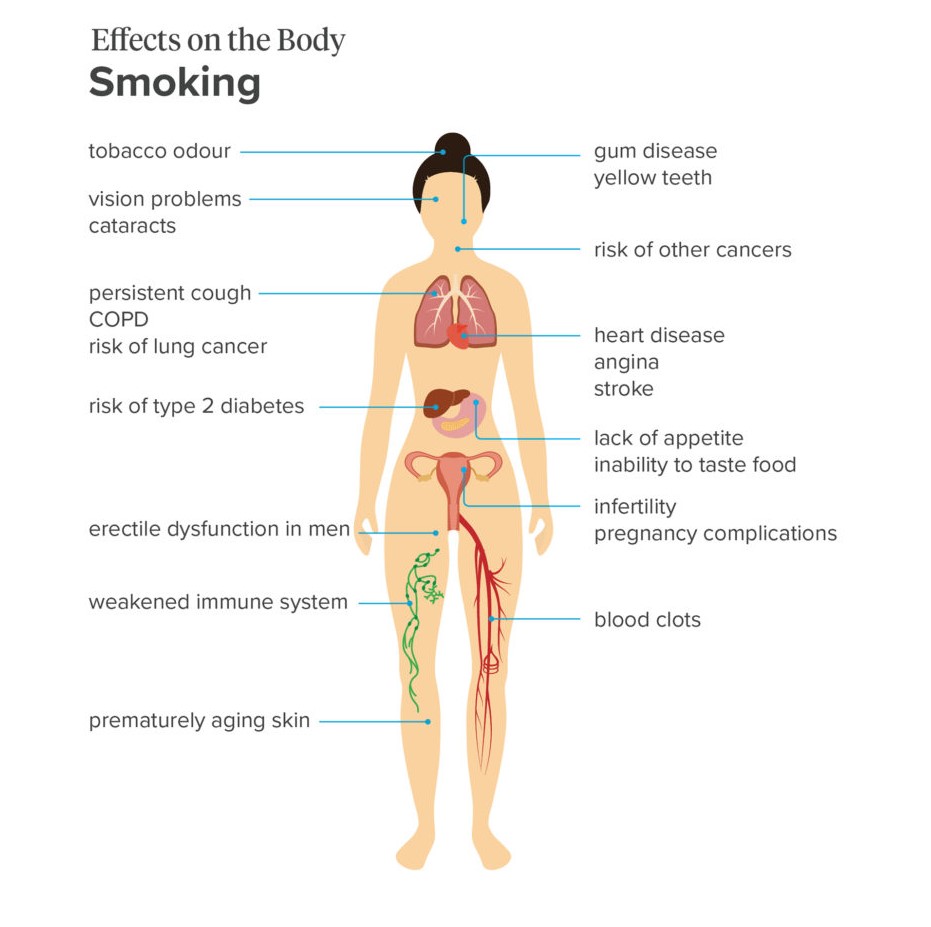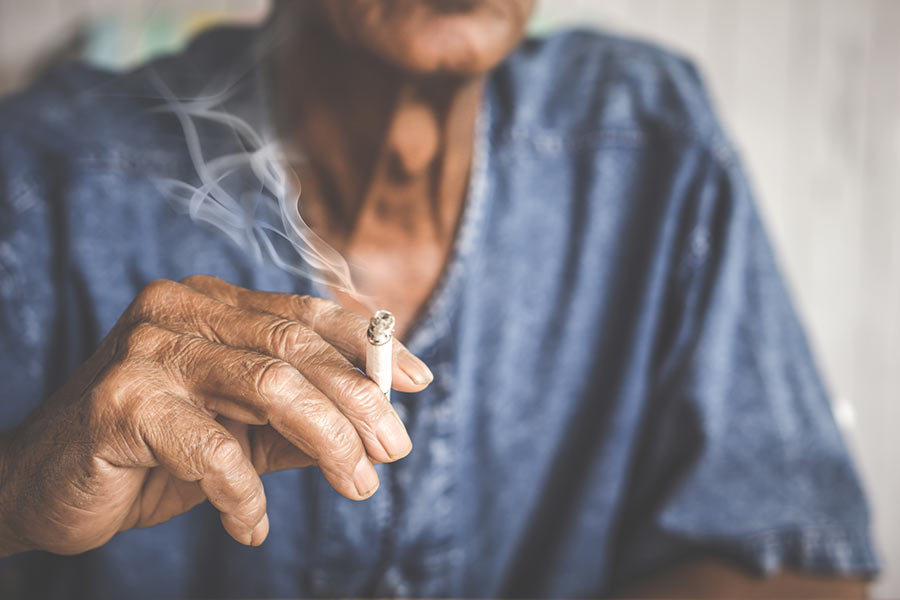Cigarette smoking is one of the most damaging habits a person can develop, yet it's also one of the most common. Despite decades of public health warnings, millions of people continue to smoke worldwide—and the impact on personal health is enormous. Smoking isn’t just bad for you in some abstract way—it’s a direct, destructive force that can affect virtually every part of your body, often in irreversible and sometimes fatal ways.
The damage caused by smoking doesn’t happen all at once. It builds slowly, silently, affecting internal systems even before external symptoms appear. The longer you smoke, the greater the risk—but even short-term use can initiate changes that raise your chances of serious illness.
The Centers for Disease Control and Prevention (CDC) notes that smoking dramatically increases your risk of death from all causes, not just those directly tied to tobacco. It affects every system in the body: lungs, heart, reproductive health, eyesight, skin, immune system, bones, and even mental clarity.
If you're wondering what specific dangers smoking poses to your health, here’s a breakdown of key conditions directly linked to this dangerous habit:
Conditions Linked to Cigarette Smoking
-
Significantly shortened lifespan – Smokers often lose 10–16 years of life compared to nonsmokers.
-
Multiple cancers – Not just lung cancer. Smoking contributes to cancers of the bladder, pancreas, kidney, throat, esophagus, and more.
-
Pneumonia – A serious lung infection that can be deadly, especially in older adults.
-
Cerebrovascular disorders – Damaged blood vessels increase the risk of stroke and heart failure.
-
Buerger’s disease – A painful circulatory condition that can lead to tissue death and amputations.
-
Angina – Chest pain due to restricted blood flow to the heart.
-
Peripheral vascular disease – Blood vessels in the limbs become damaged, often leading to reduced mobility.
-
Macular degeneration – A leading cause of blindness tied to retinal damage.
-
Impotence – Reduced blood flow can severely affect sexual function.
-
Infertility – Smoking disrupts hormone production and reproductive function in both sexes.
-
Premature skin aging – Collagen breakdown leads to early wrinkling and sagging.
-
Osteoporosis – Accelerated bone loss, increasing the risk of fractures.
-
Chronic obstructive pulmonary disease (COPD) – A progressive, disabling lung condition that makes breathing increasingly difficult.
Smoking can trigger or worsen nearly every chronic condition known to medicine. The following sections break down the most well-documented effects.

1. Harm to the Lungs and Respiratory System
Every time you inhale cigarette smoke, you're exposing your lungs to a cocktail of toxic chemicals—nicotine, tar, carbon monoxide, and hundreds of other compounds that have no business inside your body.
Lung tissue, once exposed to this constant abuse, begins to deteriorate. The most notorious result? Lung cancer. According to the CDC, smoking is responsible for approximately 90% of all lung cancer deaths, with male smokers facing a 25x greater risk, and female smokers a 25.7x higher risk, compared to nonsmokers.
But the damage doesn’t stop there. Smokers also face a significantly increased chance of developing:
-
Chronic bronchitis, where airways remain inflamed and congested.
-
Emphysema, which destroys the lung’s air sacs and reduces oxygen intake.
-
COPD, a combination of these conditions that can become severely disabling over time.
-
Asthma flare-ups, which may be triggered or worsened by smoke exposure.
Even light or occasional smoking damages the lungs. And quitting, at any stage, is the only way to begin reversing some of that damage.
2. Increased Risk of Cardiovascular Diseases
Cigarettes don't just harm your lungs—they ravage your heart and blood vessels. The chemicals in tobacco smoke inflame and damage blood vessel linings, paving the way for atherosclerosis—the buildup of fatty plaque that narrows and stiffens the arteries.
This leads to increased chances of:
-
Heart attacks
-
Strokes
-
Blood clots
-
Chest pain (angina)
Smoking also contributes to peripheral artery disease (PAD), which restricts blood flow to the arms and legs. PAD not only causes chronic pain but is also a major warning sign for more serious heart events to come.
And here's the kicker—even former smokers retain some of this increased risk. So the sooner you quit, the more cardiovascular damage you can avoid.
3. Damage to Reproductive Health and Fertility
Smoking can seriously compromise reproductive health in both men and women. For women, the chemicals in cigarettes may disrupt hormone balance, interfere with ovulation, and damage reproductive organs—making conception more difficult and increasing the risk of miscarriage.
In men, smoking contributes to erectile dysfunction by limiting blood flow, while also lowering sperm quality, motility, and volume. The longer the exposure, the higher the risk.
Studies show that couples where one or both partners smoke take significantly longer to conceive and face a greater chance of pregnancy complications—even with assisted fertility treatments.

4. Serious Pregnancy-Related Health Risks
Smoking while pregnant is especially dangerous—for both the mother and the developing baby. The CDC highlights a range of complications directly tied to tobacco use during pregnancy, including:
-
Ectopic pregnancy – when the embryo implants outside the uterus, a potentially fatal condition.
-
Low birth weight – which increases the risk of developmental delays and early health complications.
-
Preterm delivery – often requiring long neonatal hospital stays.
-
Damage to fetal organs, particularly the lungs, brain, and nervous system.
-
Increased risk of sudden infant death syndrome (SIDS).
-
Higher rates of birth defects, such as cleft palate or cleft lip.
Exposure to cigarette smoke during pregnancy can alter the baby's DNA, immune development, and long-term health. The risks are so well-documented that quitting smoking is one of the most important steps a pregnant person can take for their child’s future.
5. Higher Likelihood of Developing Type 2 Diabetes
There is a clear and consistent link between cigarette smoking and the development of type 2 diabetes. According to CDC data, smokers have a 30–40% higher risk of being diagnosed with the condition.
Even more concerning, for people who already have diabetes, smoking can make blood sugar control more difficult. It amplifies the effects of insulin resistance, damages blood vessels, and worsens inflammation—all of which complicate the management of the disease.
In other words, smoking doesn’t just increase the odds of developing diabetes—it makes the consequences of the disease harder to manage and more dangerous over time.

6. Weaker Immune System and Increased Inflammation
Cigarette smoke is a known immune suppressor. It dulls the body's natural defense systems, making you more vulnerable to infections and illnesses ranging from the common cold to pneumonia.
Additionally, smoking causes chronic inflammation, which is at the root of many long-term diseases. A constantly inflamed body puts stress on organs, increases fatigue, and can even accelerate aging.
Smokers often heal more slowly after injuries or surgeries and are at higher risk of complications during medical procedures due to impaired immune response.
7. Threats to Eye Health and Vision
Your eyes might not be the first thing you think about when considering the risks of smoking—but they should be. Cigarette smoke significantly raises your chances of experiencing serious eye disorders that can lead to vision loss over time.
Some of the most common problems linked to smoking include:
-
Cataracts – clouding of the eye's lens, leading to blurred or dimmed vision.
-
Age-related macular degeneration (AMD) – damage to the part of the retina responsible for central vision.
-
Glaucoma – a condition caused by high pressure inside the eye, which can damage the optic nerve.
-
Diabetic retinopathy – worsened by smoking in people with diabetes, affecting blood vessels in the retina.
-
Chronic dry eye – which can lead to irritation, blurry vision, and eye fatigue.
Over time, the toxic chemicals in smoke accelerate oxidative stress and damage the blood vessels in the eyes. The result is a slow degradation of vision—often irreversible.
8. Poor Oral Health and Dental Problems
Smoking can wreak havoc on your mouth, teeth, and gums—and it doesn’t take long for the effects to show.
People who smoke are twice as likely to develop periodontal (gum) disease, which is a leading cause of tooth loss in adults. The more cigarettes you smoke, and the longer you do it, the higher your risk becomes.
Common signs of gum disease include:
-
Swollen, tender, or bleeding gums
-
Persistent bad breath
-
Receding gum lines
-
Loose teeth
-
Increased tooth sensitivity
Beyond gum disease, smoking dulls your sense of taste and smell, contributes to tooth discoloration, and increases the likelihood of oral cancers. Even cosmetic issues, like yellow teeth or stained lips, reflect the deeper problems hiding beneath the surface.
9. Skin Aging and Hair Damage
Smoking doesn’t just affect your internal health—it leaves visible marks on your appearance, too.
The skin of smokers tends to age faster, developing wrinkles and sagging earlier in life. Why? Because cigarette smoke reduces blood flow to the skin, breaking down collagen and elastin—the proteins that keep your skin firm and elastic.
Consequences include:
-
Deep lines around the eyes and mouth
-
Uneven skin tone
-
Dull or grayish complexion
-
Slower wound healing
Hair isn’t immune either. Smokers may notice premature hair thinning, increased risk of baldness, and persistent odors in the hair due to lingering smoke particles. Smoking doesn’t just smell bad—it makes you look older, faster.
10. Risk of Multiple Other Cancers
While most people are aware that smoking causes lung cancer, fewer realize how many other types of cancer are linked to tobacco use.
According to the American Cancer Society:
-
Smoking accounts for 20–30% of all pancreatic cancer cases.
-
Smokers are 3 times more likely to develop bladder cancer.
-
Stomach cancer, especially near the esophagus, occurs more frequently in smokers.
-
The risk of esophageal and throat cancers more than doubles.
-
Smoking increases your chances of developing:
-
Mouth cancer
-
Laryngeal cancer
-
Kidney cancer
-
Cervical cancer
-
Colon cancer
-
Liver cancer
-
Acute myeloid leukemia
-
In short, cigarettes don't just affect the organs directly exposed to smoke—they send carcinogens throughout the bloodstream, affecting the entire body.
The Hidden Dangers of Secondhand Smoke
You don’t have to smoke yourself to suffer the consequences.
Secondhand smoke—the smoke exhaled by a smoker or released from a burning cigarette—contains hundreds of toxic substances. These pose serious risks to anyone exposed, especially children, pregnant individuals, and people with pre-existing health conditions.
Effects of secondhand smoke exposure include:
-
Higher risk of respiratory infections, colds, and ear problems
-
Worsening of asthma symptoms
-
Increased blood pressure in nonsmokers
-
Long-term heart damage and vascular strain
-
Reduced levels of “good” HDL cholesterol
The CDC has made it clear: there is no safe level of secondhand smoke exposure. Even brief exposure can trigger damage—especially to developing lungs and cardiovascular systems.
Why Quitting Smoking Matters—Starting Now
Quitting smoking is hard. But the body begins to repair itself almost immediately once you stop. And those benefits build up fast.
Let’s look at what happens once you quit:
-
After 20 minutes to 12 hours – Your heart rate and blood oxygen levels normalize.
-
After 1 year – Heart disease risk drops significantly. You’ll cough less and breathe better.
-
After 2 to 5 years – Your risk of stroke becomes similar to someone who never smoked.
-
After 5 to 15 years – Your risk of oral, esophageal, and bladder cancer cuts in half.
-
After 10 years – Lung cancer risk falls by about 50%.
-
After 15 years – Your heart disease risk is comparable to that of a lifelong nonsmoker.
Nicotine withdrawal isn’t easy—it may cause irritability, strong cravings, increased appetite, and mood swings. But these symptoms are temporary. With time, your body recalibrates, your brain adjusts, and you begin to feel stronger—physically and emotionally.
Getting help from a healthcare provider or a cessation program can double or even triple your chances of quitting for good. And every day you go smoke-free, your body thanks you.









